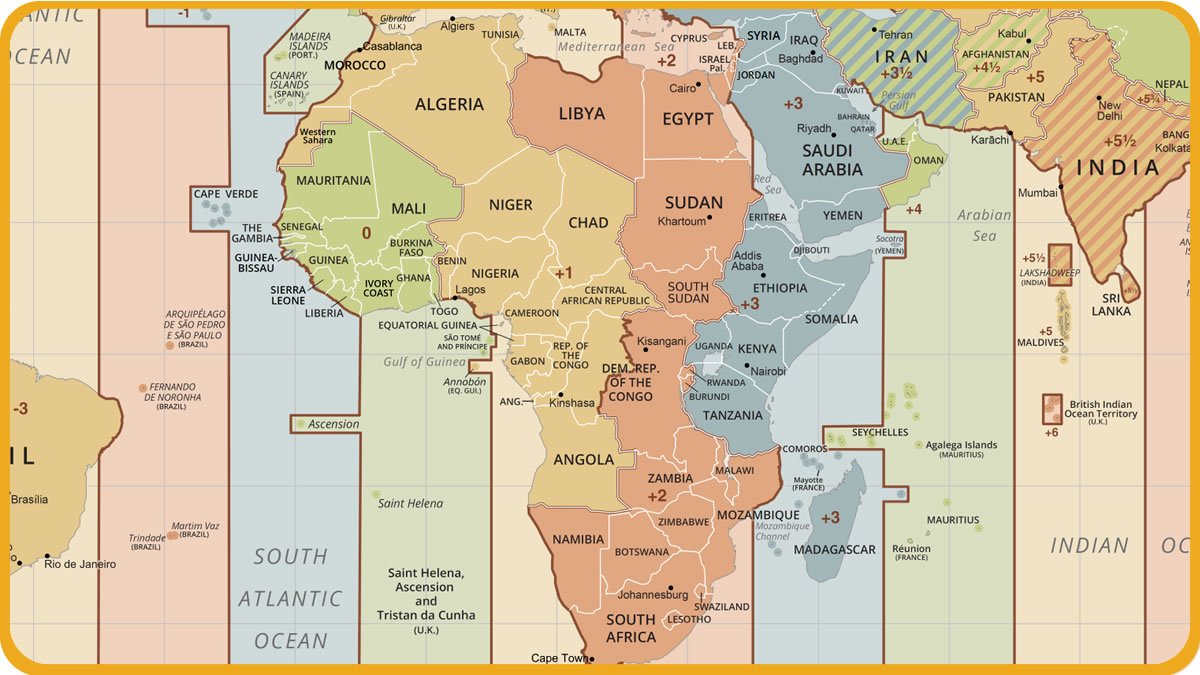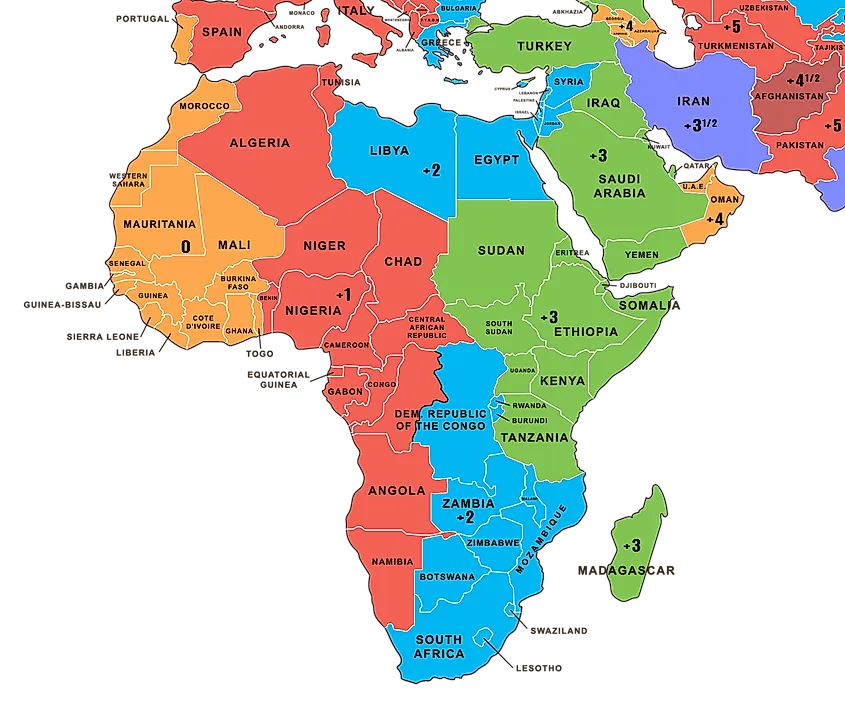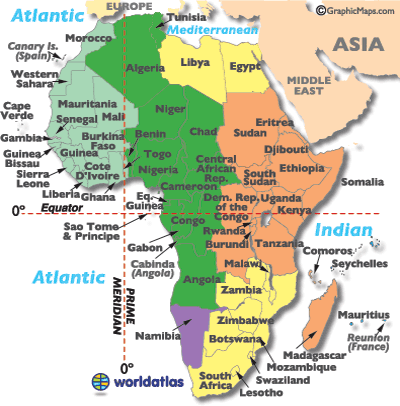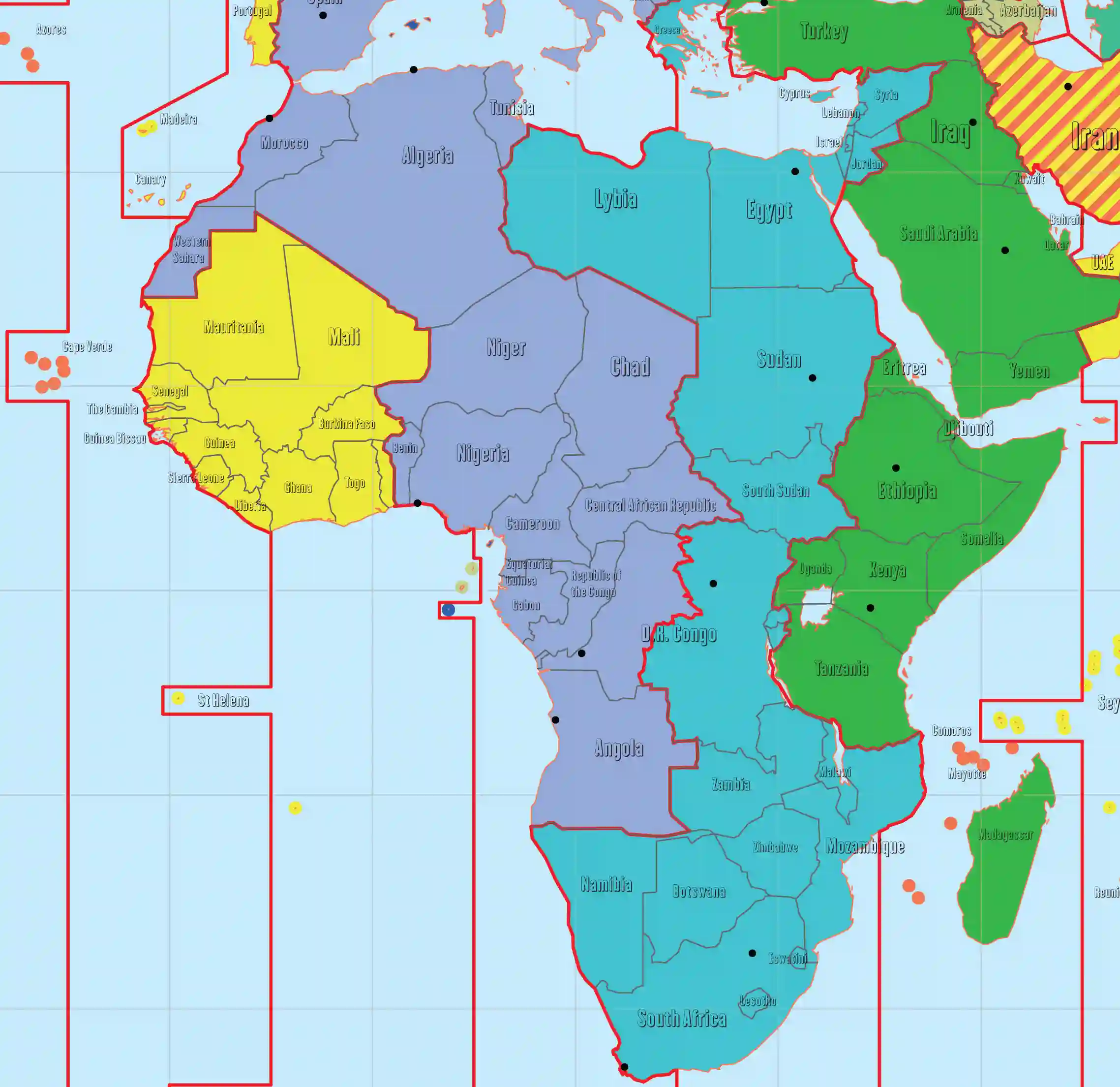Navigating Time Across Africa: A Comprehensive Guide to African Time Zones
Related Articles: Navigating Time Across Africa: A Comprehensive Guide to African Time Zones
Introduction
With enthusiasm, let’s navigate through the intriguing topic related to Navigating Time Across Africa: A Comprehensive Guide to African Time Zones. Let’s weave interesting information and offer fresh perspectives to the readers.
Table of Content
Navigating Time Across Africa: A Comprehensive Guide to African Time Zones

Africa, the second-largest continent, encompasses a vast expanse of land, stretching across diverse landscapes and ecosystems. This geographic diversity also translates into a complex system of time zones that regulate daily life across the continent. Understanding the intricacies of African time zones is crucial for anyone traveling, conducting business, or simply seeking to grasp the interconnectedness of this vibrant continent.
A Continental Mosaic of Time Zones:
Africa is divided into four main time zones, each representing a distinct time difference from Coordinated Universal Time (UTC), the international standard time. These time zones are:
- UTC+0: This zone, encompassing Western Africa, includes countries like Morocco, the Canary Islands, and Western Sahara. It aligns with Greenwich Mean Time (GMT), the time at the Prime Meridian.
- UTC+1: Covering Central Africa, this time zone encompasses countries such as Algeria, Tunisia, and Egypt.
- UTC+2: The most prevalent time zone in Africa, covering a large swathe of the continent from West to East. Countries like Nigeria, South Africa, and Ethiopia fall within this zone.
- UTC+3: This zone, encompassing Eastern Africa, includes countries like Kenya, Tanzania, and Somalia.
The Influence of Geography and History:
The distribution of time zones across Africa reflects a combination of geographic and historical factors. The longitudinal spread of the continent, coupled with its proximity to the Prime Meridian, has significantly influenced the time zone boundaries. Furthermore, historical ties to colonial powers have also played a role in shaping the time zones of certain regions.
The Importance of Time Zones in Africa:
Understanding African time zones is crucial for various reasons:
- Travel and Communication: Accurate time information is essential for travelers to plan their itineraries, schedule meetings, and communicate effectively with individuals in different time zones.
- Business and Trade: Time zones play a vital role in international business dealings, ensuring efficient coordination of meetings, transactions, and logistical operations.
- Coordination of Activities: Time zones are crucial for coordinating activities across diverse regions, particularly in sectors like transportation, energy, and telecommunications.
- Scientific Research: Time zones are essential for scientific research, particularly in fields like astronomy, meteorology, and environmental monitoring.
Navigating Time Zones in Africa:
To effectively navigate the complex time zone system in Africa, several key considerations are important:
- Time Zone Maps: Referencing a comprehensive map of African time zones provides a visual representation of the time differences across the continent.
- Time Zone Converters: Online time zone converters offer an efficient way to calculate time differences between any two locations in Africa.
- Local Time: Always confirm the local time of the specific region you are visiting or interacting with, as time zones can vary within countries.
- Time Zone Abbreviations: Familiarize yourself with the common time zone abbreviations used in Africa, such as WAT (West Africa Time), CAT (Central Africa Time), and EAT (East Africa Time).
FAQs About African Time Zones:
Q: Why are there different time zones in Africa?
A: The different time zones in Africa are primarily determined by the continent’s longitudinal spread and its proximity to the Prime Meridian.
Q: How many time zones are there in Africa?
A: Africa is divided into four main time zones: UTC+0, UTC+1, UTC+2, and UTC+3.
Q: Which countries share the same time zone?
A: Several countries share the same time zone in Africa. For example, Nigeria, South Africa, and Ethiopia all fall within UTC+2.
Q: How do I convert time between different African time zones?
A: You can use online time zone converters or consult a time zone map to convert time between different African time zones.
Q: Are there any countries in Africa that have multiple time zones?
A: Yes, some countries in Africa, such as Morocco and Egypt, have multiple time zones due to their geographical size.
Tips for Traveling in Africa:
- Check Time Zones: Before traveling to Africa, research the time zone of your destination and adjust your watch or phone accordingly.
- Consider Time Differences: When planning your itinerary, factor in the time differences between different locations to avoid scheduling conflicts.
- Use Time Zone Converters: Utilize online time zone converters to calculate time differences for meetings, calls, and other activities.
- Respect Local Time: Be mindful of local time customs and be respectful of the time schedules of your hosts and colleagues.
Conclusion:
The African time zone map is a testament to the continent’s vastness and diversity. Understanding the intricacies of African time zones is crucial for effective communication, travel planning, and business dealings. By navigating the complexities of this system, individuals can foster deeper connections with the continent and contribute to its vibrant global presence.








Closure
Thus, we hope this article has provided valuable insights into Navigating Time Across Africa: A Comprehensive Guide to African Time Zones. We hope you find this article informative and beneficial. See you in our next article!